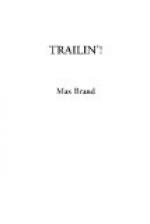In the shed to the rear they tied the horses and unsaddled. In the single room of the shanty, afterward, Nash lighted a candle, which he produced from his pack, placed it in the centre of the floor, and they unrolled their blankets on the two bunks which were built against the wall on either side of the narrow apartment.
Truly it was a crazy shack—such a building as two men, having the materials at hand, might put together in a single day. It was hardly based on a foundation, but rather set on the slope side of the hill, and accordingly had settled down on the lower side toward the door. Not an old place, but the wind had pried and the rain warped generous cracks between the boards through which the rising storm whistled and sang and through which the chill mist of the coming rain cut at them.
Now and then a feeling came to Anthony that the gale might lift the tottering old shack and roll it on down the hillside to the floor of the valley, for it rocked and swayed under the breath of the storm. In a way it was as if the night was giving a loud voice to the silent struggle of the two men, who continued pleasant, careless with each other.
But when Nash stepped across the room behind Bard, the latter turned and was busy with the folding of his blankets at the foot of his bunk, his face toward the cowpuncher and when Bard, slipping off his belt, fumbled at his holster, Nash was instantly busy with the cleaning of his own gun.
The cattleman, having removed his boots, his hat, and his belt, was ready for bed, and slipped his legs under the blankets. He stooped and picked up his lariat, which lay coiled on the floor beside him.
“People gets into foolish habits on the range,” he said, thumbing the strong rope curiously, and so doing, spreading out the noose.
“Yes?” smiled Bard, and he also sat up in his bunk.
“It’s like a kid. Give him a new toy and he wants to take it to bed with him. Ever notice?”
“Surely.”
“That’s the way with me. When I go to bed nothin’ matters with me except that I have my lariat around. I generally like to have it hangin’ on a nail at the head of my bunk. The fellers always laugh at me, but I can’t help it; makes me feel more at home.”
And with that, still smiling at his own folly in a rather shamefaced way, he turned in the blankets and dropped the big coil of the lariat over a nail which projected from the boards just over the head of his bunk. The noose was outermost and could be disengaged from the nail by a single twist of the cowpuncher’s hand as he lay passive in the bunk.
On this noose Bard cast a curious eye. To cityfolk a piece of rope is a harmless thing with which one may make a trunk secure or on occasion construct a clothes line on the roof of the apartment building, or in the kitchen on rainy Mondays.
To a sailor the rope is nothing and everything at once. Give a seaman even a piece of string and he will amuse himself all evening making lashings and knots. A piece of rope calls up in his mind the stout lines which hold the masts steady and the yards true in the gale, the comfortable cable which moors the ship at the end of the dreary voyage, and a thousand things between.




